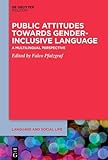Public Attitudes Towards Gender-Inclusive Language : A Multilingual Perspective / ed. by Falco Pfalzgraf.
Material type: TextSeries: Language and Social Life [LSL] ; 31Publisher: Berlin ; Boston : De Gruyter Mouton, [2024]Copyright date: 2024Description: 1 online resource (VI, 417 p.)Content type:
TextSeries: Language and Social Life [LSL] ; 31Publisher: Berlin ; Boston : De Gruyter Mouton, [2024]Copyright date: 2024Description: 1 online resource (VI, 417 p.)Content type: - 9783111201252
- 9783111202976
- 9783111202280
- 306.44 23/eng/20240911
- P120.S48 P83 2024
- online - DeGruyter
- Issued also in print.
| Item type | Current library | Call number | URL | Status | Notes | Barcode | |
|---|---|---|---|---|---|---|---|
 eBook
eBook
|
Biblioteca "Angelicum" Pont. Univ. S.Tommaso d'Aquino Nuvola online | online - DeGruyter (Browse shelf(Opens below)) | Online access | Not for loan (Accesso limitato) | Accesso per gli utenti autorizzati / Access for authorized users | (dgr)9783111202280 |
Frontmatter -- Contents -- Introduction and findings: Public attitudes towards gender-inclusive language – A multilingual perspective -- Finnish and Spanish speakers’ attitudes towards gender-inclusive language in English -- The gender-inclusive language debate in France: A battle to save the soul of the nation? -- Online attitudes towards gender-inclusive language in French -- Using gender-inclusive language in German? It’s a question of attitude . . . -- Motivations for the use of gender-fair language in research literature in German academia -- On the “invention” of the Gendersprache in German media discourse -- Attitudes of the purist association Verein Deutsche Sprache (VDS) towards gender-inclusive use of German. A conceptual expansion of the term linguistic purism -- Using pair forms, criticizing the gender star – Attitudes towards binary and non-binary gender-inclusive language in German -- Gender-inclusive strategies in Italian: stereotypes and attitudes -- Attitudes toward sexist/nonsexist language in Chinese -- Opposition discourse in the public debate on gender-inclusive language in Poland -- Myths and models concerning gender inclusivity and non-binary forms in Romanian -- Ten years with hen. Attitudes towards the Swedish gender-neutral pronoun hen in public online comments and official language recommendations (2012–2022) -- Attitudes toward gender-inclusive pronouns in Swedish and English -- Index
restricted access online access with authorization star
http://purl.org/coar/access_right/c_16ec
The (potential) use of gender-inclusive language is being discussed controversially in the public sphere. Opinions on it have increasingly been voiced by individuals as well as organisations. These include state institutions, private associations, subject specialists such as linguists, and private individuals / laypeople. Views of and attitudes towards the use of gender-inclusive language cover a broad spectrum between extreme ends, and even subject specialists hold conflicting views. Research on gender-inclusive language is very much a current trend in linguistics, including the so-called ‘genderless’ languages. However, the focus is mostly on structural issues, while sociolinguistic research on attitudes towards the use of gender-inclusive language is mostly missing. Some scattered work in this area has been published, but a more thorough understanding and conceptualisation of attitudes is still needed. Furthermore, a multilingual, comparative perspective is still missing. This edited volume will address these shortcomings.
Issued also in print.
Mode of access: Internet via World Wide Web.
In English.
Description based on online resource; title from PDF title page (publisher's Web site, viewed 20. Nov 2024)


